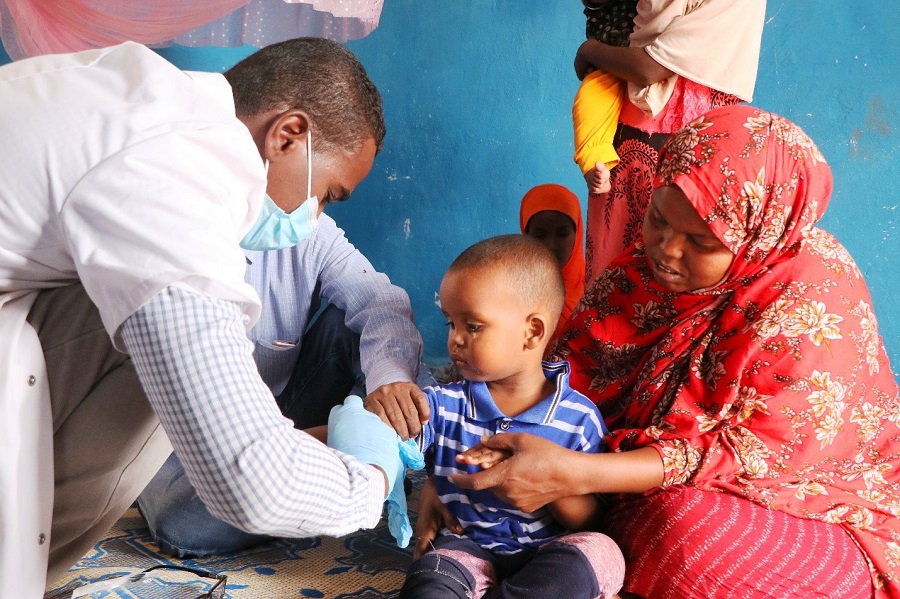 WHO-supported health worker administering vaccine to a child at a primary health care centre in Galkayo, Puntland. WHO/Fouzia Bano
WHO-supported health worker administering vaccine to a child at a primary health care centre in Galkayo, Puntland. WHO/Fouzia Bano
Mogadishu, 11 December 2022 – The Government of the United Kingdom of Great Britain and Northern Ireland (UK) and the World Health Organization country office in Somalia have recently signed an agreement to support WHO’s emergency health response to the current drought in the country.
In support of Federal and State Ministries of Health in Somalia, this important contribution will enable WHO to prevent and mitigate the adverse impacts of drought on health of the women, children and other vulnerable populations impacted by the ongoing drought, one of the worst in recent history.
The contribution received from the UK Government will enable WHO to scale up and sustain its integrated health and nutrition interventions in some of the worst affected, hard-to-reach and inaccessible areas where the people have been devoid of basic health and nutrition services for decades. The delivery of these interventions will support the “First-line Integrated Response Framework” endorsed by the Humanitarian Country Team (HCT) of Somalia. Under the rapid response mechanism of this framework, 4 life-saving sectors – health, nutrition, WASH and food security are delivering a set of life-saving interventions in an integrated manner as part of these sector’s ongoing relief assistance close to locations where these vulnerable populations are currently living. The delivery of these interventions has targeted women and children, among other vulnerable groups, as they have been the worst affected in this drought.
WHO intends to deliver part of these preventive health interventions, such as risk communication, nutrition screening, referral and distribution of micronutrient supplements, including identifying children who are sick and have missed out on routine immunization through the community health workers who are mostly female and drawn from the same communities in which these services will be delivered.
In addition, with this new funding from the UK, WHO will support deployment of a number of mobile outreach teams in these areas for administering childhood vaccines, supporting antenatal care thorough the provision of iron and folic tablets to pregnant women, treatment and referral of sick and malnourished children, as well as treatment and care of women and children with common ailments. Improving access to health care and other preventive health and nutrition interventions for these vulnerable populations who have been devoid of basic health services for decades will mean that every vulnerable child and every woman of child bearing age, including pregnant and lactating women, living in these hard-to-reach and inaccessible areas will be protected from diseases that are preventable. With a focus on 16 operational priority-one districts, severely affected by the ongoing drought, WHO expects that approximately 2 million people will be reached through these integrated health and nutrition activities.
“The situation remains dire. Disease and lack of access to health care pose the biggest threat to millions of Somalis impacted by the drought. WHO’s unique expertise and emergency health response is critical. This new UK support to the WHO will save lives and avert famine and its consequences,” said UK’s Development Director for the Foreign Commonwealth and Development Office Somalia Damon Bristow.
In addition, with this funding support, WHO will support conducting prospective and real-time mortality surveillance through a national and international academic institution to estimate “excess death” from all causes attributed to drought, a measure which is often used to declare famine and also a proxy to better understand the effectiveness of the humanitarian operational response. Also, as part of this initiative, WHO will continue to collaborate with UNICEF and the World Food Programme in order to support the integrated response framework endorsed by the HCT.
Commending the support extended by the UK Government, WHO Representative to Somalia Dr Mamunur Rahman Malik said, “As the threat of famine is looming large, this timely contribution from the UK will help us to save lives among the most vulnerable populations affected by this drought, the scale of which is unprecedented. This support will ensure that we sustain our community-based health and nutrition interventions, including surveillance for early detection of epidemic-prone diseases in some of the most challenging and operating environment that our agency has worked in in recent time. I also thank the Foreign Commonwealth and Development Office for their support to our work in mortality estimates. This is the first time in this country that such work related to mortality has ever been undertaken. The data from such estimates will help us and other agencies to take evidence-based decisions on the basis of quality of our response and target areas and populations who are at most risk of dying from hunger, disease and malnutrition in the country. I take this opportunity to express our most sincere appreciation to the Foreign Commonwealth and Development Office for their partnership with us for advancing health in Somalia.”
For additional information, please contact:
Joy Odero
UK Foreign Commonwealth and Development Office
Head of Communications Kenya & Somalia
Kyle DeFreitas
External Relations Officer
Fouzia Bano
Communications Officer
Related links
/images/stories/somalia/weekly-cholera-report-week-43-2022.pdf?ua=1
Technical program update_May-Aug_2022 (who.int)


